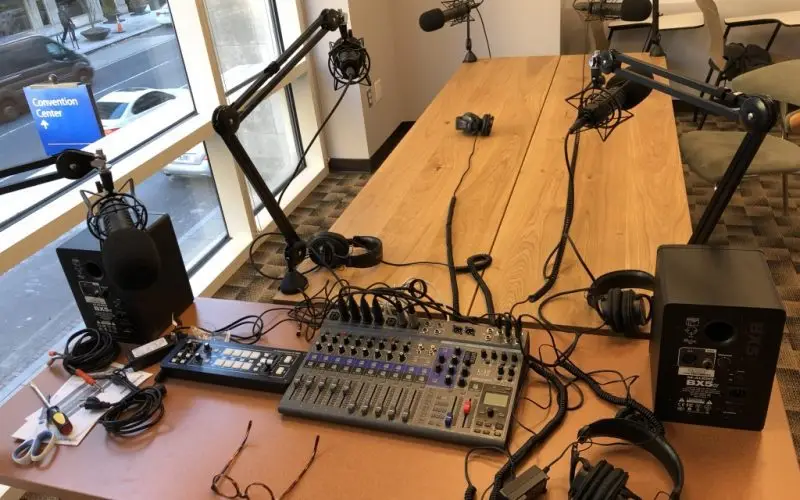Switch and Board
Podcasting in a Pandemic
What a year! 2020 got weird fast and now we’re all living in some strange and uncertain times.
What Equipment Do I Need to Start a Podcast?
Many of us are overloaded. If you don’t have an active social life, at least one side-hustle, and/or regular family obligations, then you might just be struggling to consume all the premium streaming content you love so much.
10 Reasons To Start A Podcast
Unless you live under a rock, you have wondered if you should start a podcast. With their huge rise in popularity over the last several years, it seems like everyone and their dog has a podcast. If you’re on the fence or wondering why everyone is doing it check out Switch and Board’s 10 Reasons to Start a Podcast.
1. To increase your reach by generating content on a platform used by more than 50% of the population
According to Podcastinsights.com, around 51% of people have listened to a podcast and that number is steadily growing every year. Those listeners listen to an average of 7 podcasts per week. If you’re not putting your content into podcast form, you are missing out on over 50% of the population.
2. To build an audience
If you’re a content-creator of any kind, podcasting can be a great way to build your audience. Someone out there is interested in your specific brand. The best thing about podcasting is that it allows each content-creator to dive deep into their specific interest. Much like when we first got the internet, this brings people with unique interests together from all over the world.
“ If you’re not putting your content into podcast form, you are missing out on over 50% of the population. “
3. To test out content and get feedback as you go
Recording a podcast is a great way to work through material you’re working on as you go. If you are compiling a blog, a website, or a book, trying out your ideas in the audio format first is a great way to see what works and what doesn’t. You can solicit feedback from your listeners to figure out which direction to take your work or to figure out what they’d like to see more of.
4. To fill a need in a specific area
You’re weird! We all are. You have a unique approach to an otherwise well-known topic. Your specific combination of experience and interest makes you uniquely qualified to elaborate on something. Start searching for podcasts in your interest area. You may find some, but you’ll notice that many are discontinued or cover things from an angle you disagree with. Find what’s lacking and correct it by filling a need. Chances are if you’ve noticed a gap, others have too.
5. To join the club
Is there someone who covers a similar subject matter who you admire? Starting a podcast is a great way to introduce yourself. After you’ve recording some episodes, reach out. Ask them to be a guest on your podcast or to do a phone interview. Afterwards, you can guest on their show. This is a great way to share your ideas with like-minded people.
6. To develop a deeper relationship with your audience or clients
Listeners are loyal and there’s an intimacy that comes with hearing someone’s voice in your ear. Whether you prefer to do a scripted show or something off-the-cuff, your personality will shine through. Personally, I’ve listened to my favorite podcasters as they’ve experienced lose, success, disappointment, and everything else. Even the scripted podcasts will address their successes, their goals, and their struggles keeping up in a way that feels like a personal connection.
7. To give your brand a voice and to stay on the forefront of your clients’ minds
Dropping a podcast weekly is a great way to remind people you exist. When your listeners subscribe they will see your new episodes every week. This keeps you fresh in their minds and up-to-date with your content. Since people find listening easier and more convenient than reading, they are more likely to stay on top of weekly audio content than written content.
8. To breathe new life into old content
If you’ve been creating content for a while, there’s no need to start again from scratch. You can repurpose old content into the audio format. This will give your audience a new modality to enjoy your content and reach more people who may have missed it the first go around.
9. To showcase your expertise and passion
With great expertise comes great responsibility. Share it! Let everyone know just how much you know in a podcast. Podcasting is the perfect medium to expound your preferred subject matter since there are no set formats, rules, or barriers to entry. You don’t need an agent or a publicist to get started. If you have something to say, podcasting is the easiest way to do it.
10. To support your partners and supporters by shouting them out
If you have collaborators, sponsors, or advertisers starting a podcast is just one more way to give back. You can either sell them air time and give them another way to reach their clients, or shout them out for their support. They will appreciate the exposure and it will strengthen your relationship.
4 Reasons to Rent a Studio for Your Podcast
Many of us are overloaded. If you don’t have an active social life, at least one side-hustle, and/or regular family obligations, then you might just be struggling to consume all the premium streaming content you love so much.

